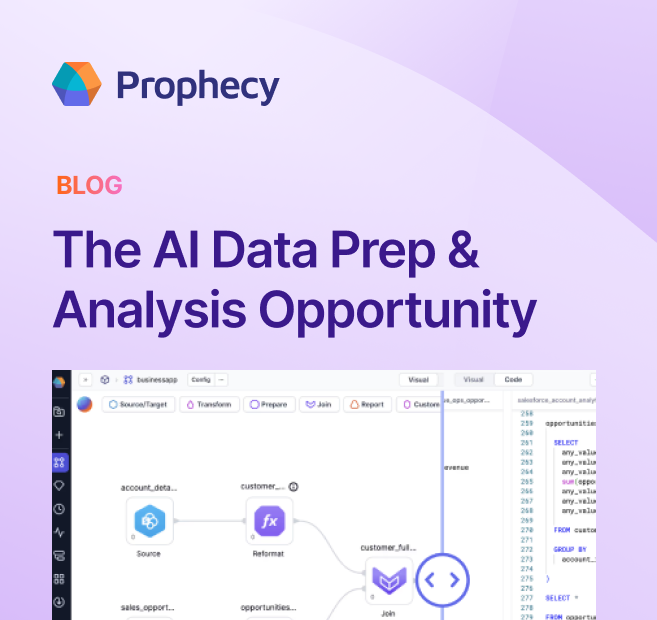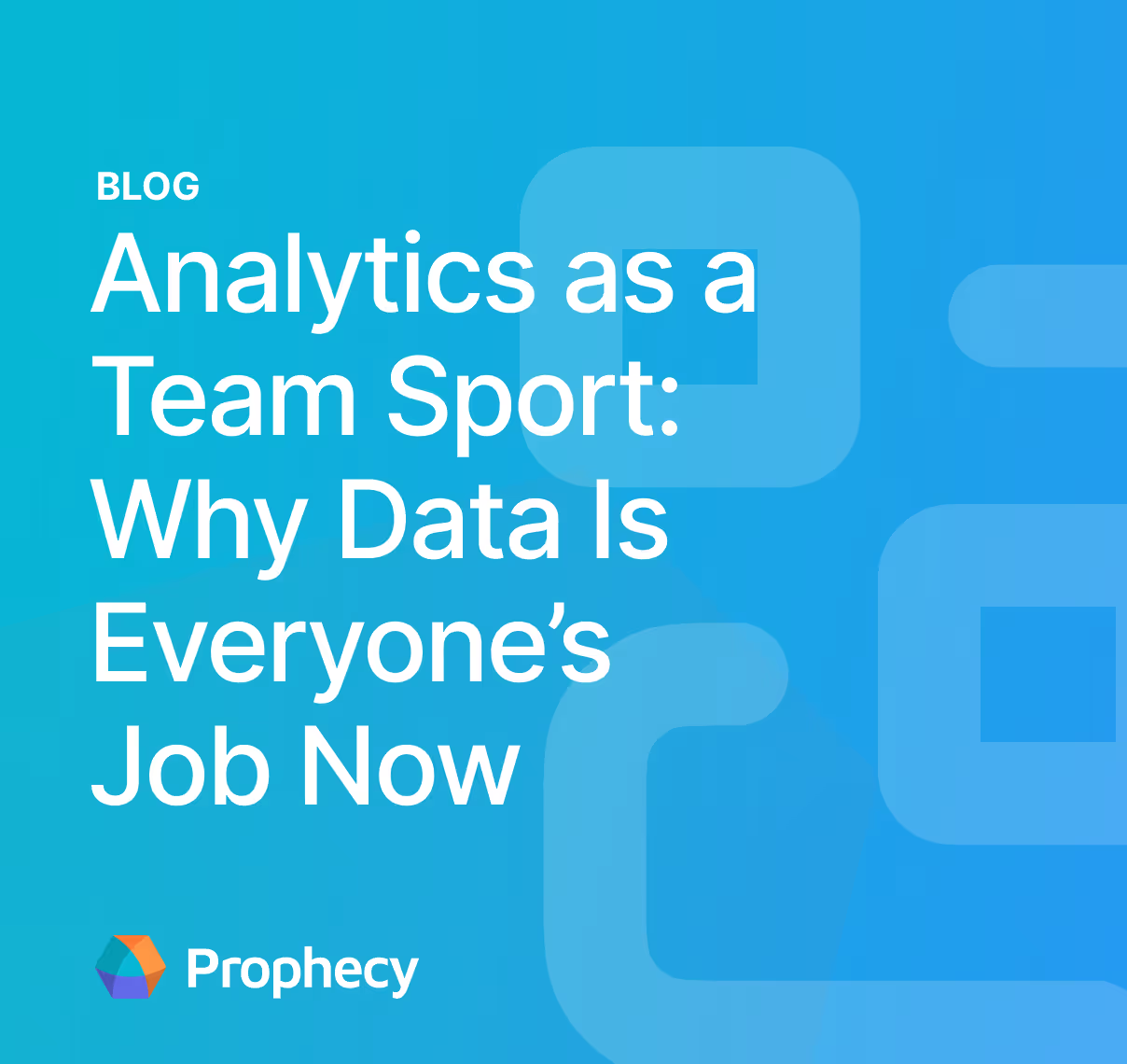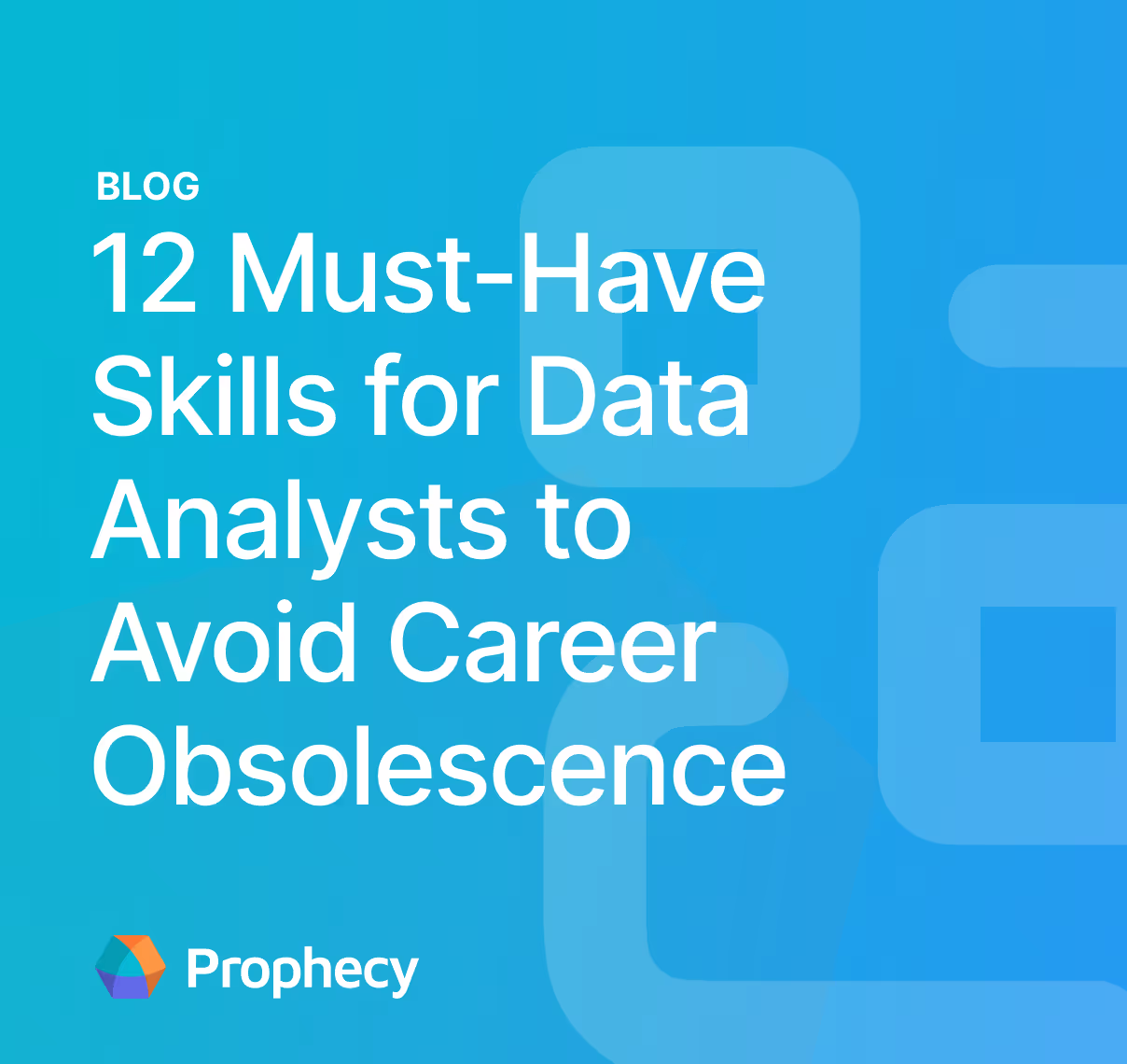The Future of Data Is Agentic: Key Insights from Our CDO Magazine Webinar
Discover how modern data leaders are approaching agentic AI to deliver governed self-service and speed up access to data.
Last week, I had the privilege of moderating a fantastic discussion for CDO Magazine on "The Rise of AI Agents and Data Democratization." The conversation with Shannon Hughes from ExxonMobil and Tom Hughes from Navy Federal Credit Union was both inspiring and practical. It was exactly the kind of dialogue we need as we navigate this rapidly evolving landscape.
As someone who's been thinking about AI-native approaches to data here at Prophecy, I walked away with several key insights that I believe every data leader should consider. Here's what stood out most.
Foundation first: The measured approach wins
One of the most striking themes was how both organizations are taking what Shannon called a "measured, foundation-first approach" to AI agents. This isn't about jumping on every shiny new tool: it's about building the right infrastructure to support truly transformative capabilities.
Tom's team at Navy Federal has been on a five-year data modernization journey that's now perfectly positioning them for their "agentic AI journey." Shannon's team at ExxonMobil is focusing on strengthening cataloging, semantics, and governance that will feed AI systems. As Shannon put it: "To get there, we really need to make sure that data is trusted, accessible and well understood."
Key takeaway: The organizations seeing the biggest wins with AI agents are the ones building the strongest foundations.
Redefining data products through AI agents
Shannon painted a compelling picture of how AI agents could revolutionize data product creation. Imagine prompting an agent: "What are the right sources to help answer this business question?" Then, having it model the data you need, build pipelines through natural language, deploy data structures, validate quality, and even catalog the results for others to find.
This isn't just automation; it's democratization at scale. Tom echoed this, describing how they're moving from three-month data pipeline projects to three-hour turnarounds using natural language as "the developer language of choice."
Key takeaway: AI agents are fundamentally changing who can create data products.
The interface revolution
Throughout our conversation, we kept coming back to interfaces. Not just the technology, but how they lower what one of my clients called "the energy barrier to accessing and playing with data."
Tom described a future where chat becomes the primary user interface, with semantic information models directing users to the right systems behind the scenes. No more logging into multiple systems. Instead, users get conversational access to the data and insights they need.
I've experienced this shift personally. I find myself chatting with data rather than writing SQL, which still feels weird but incredibly powerful.
Key takeaway: The biggest change isn't the AI. It's meeting people where they want to work.
Governance as an enabler, not a constraint
Both panelists emphasized that governance isn't the enemy of innovation; it's what makes sustainable innovation possible. Tom, working in the highly regulated financial services industry, stressed the need for agent registries and bias monitoring. Shannon talked about finding the right balance of "minimum standardization and guardrails" that constrain appropriately while allowing creativity.
As Tom noted: "The foundation of data governance lends itself very well to transitioning into AI governance capabilities."
Key takeaway: Good governance accelerates AI adoption by building trust and reducing friction.
The people challenge is real (and solvable)
Perhaps the most honest part of our conversation was about people and change management. Shannon acknowledged that "people and processes remain one of the biggest challenges," noting that teams often want consistency but resist when it feels constraining.
Tom's approach resonated with me: start with AI literacy that addresses fundamental human concerns. "You're not going to be replaced by AI, you're going to be augmented by AI." Then build persona-based training programs that give people the right amount of information for their roles.
Shannon added something I found inspiring: this technology has motivated her to experiment on her own time, and she believes others will be similarly inspired once they see the possibilities.
Key takeaway: Successful AI adoption is more about inspiring people than training them on tools.
Where to start? Anywhere.
When asked about the best place to begin with agentic AI, both panelists gave the same advice: just start. Tom was particularly direct: "Don't really get bogged down in trying to figure out where to start. Just experiment, bring use cases to the forefront and experiment, learn."
Shannon agreed, emphasizing that experimentation helps you find where the true value lies, and then you can build a vision and roadmap from there.
Looking forward
What excites me most about this conversation is how it balances ambition with pragmatism. Both organizations are thinking big. Tom envisions a "digital workforce" operating alongside humans, while Shannon sees AI agents managing entire data product lifecycles. But they're building thoughtfully.
This feels like the right moment for this technology. We've learned from the big data hype cycles, we understand the importance of governance and change management, and we have the foundational technologies to make AI agents truly useful rather than just impressive demos.
The data world is changing rapidly, but conversations like this give me confidence we're heading in the right direction. The future is agentic, but it's also practical, governed, and ultimately human-centered.
Want to dive deeper into AI-native approaches to data? Check out our recent work on bringing natural language interfaces to data preparation, or reach out to continue the conversation about making data more accessible to everyone in your organization.
Ready to give Prophecy a try?
You can create a free account and get full access to all features for 21 days. No credit card needed. Want more of a guided experience? Request a demo and we’ll walk you through how Prophecy can empower your entire data team with low-code ETL today.
Ready to see Prophecy in action?
Request a demo and we’ll walk you through how Prophecy’s AI-powered visual data pipelines and high-quality open source code empowers everyone to speed data transformation
Get started with the Low-code Data Transformation Platform
Meet with us at Gartner Data & Analytics Summit in Orlando March 11-13th. Schedule a live 1:1 demo at booth #600 with our team of low-code experts. Request a demo here.
Related content
A generative AI platform for private enterprise data
Introducing Prophecy Generative AI Platform and Data Copilot
Ready to start a free trial?
Lastest posts

The AI Data Prep & Analysis Opportunity

Analytics as a Team Sport: Why Data Is Everyone’s Job Now


